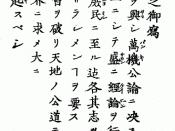The Government of Japan
Early in Japan's history, society was controlled by a ruling elite of powerful clans. The most powerful emerged as a kingly line and later as the imperial family in Yamato in the third century A.D., claiming descent from the gods who created Japan. An imperial court and government, shaped by Chinese political and social institutions, was established. Often, powerful court families effected a hereditary regency, having established control over the emperor. The highly developed culture attained between the eighth and the twelfth centuries was followed by a long period of anarchy and civil war, and a feudal society developed in which military overlords ran the government on behalf of the emperor, his court, and the regent. Although the Yamato court continued control of the throne, a succession of dynastic military regimes ruled the now-decentralized country. In the late sixteenth century, Japan began a process of reunification followed by a "golden age" of great stability and peace, in which contact with the outside world was limited and tightly controlled by the government.
After being confronted by the West during the economically troubled late eighteenth and early nineteenth centuries, Japan emerged gradually as a modern, industrial power, exhibiting some democratic institutions by the end of World War I. Beginning in the mid-nineteenth century, phenomenal social upheaval, along with political, military, and economic successes, led to an overabundance of nationalist pride and extremist solutions, and to even faster modernization. Representative government was finally replaced by increasingly authoritarian regimes, which drove Japan into World War II. After the cataclysm of nuclear war, Japan rebuilt itself based on a new desire for peaceful development, becoming an economic superpower in the second half of the twentieth century.
After being ruled by ancient, traditional laws and governed by successive family clans with absolute...


